Double IPOs headline this week's biotech financings

This week saw two $250 million-plus initial public offering (IPO) filings for Neumora Therapeutics and RayzeBio, plus a record third-round financing for Generate Biomedicines - further evidence that financing activity in the biotech sector is on the up.
Radiopharmaceuticals developer RayzeBio is due to make its Nasdaq debut this morning under the RYZB ticker, raising $311 million from the sale of 17.2 million shares at $18 each. That makes it the second-largest biotech IPO this year, after Acelyrin raised $540 million in May.
The biotech is developing a radiopharmaceutical called RYZ101 in phase 3 trials for neuroendocrine tumours (NETs), seeking to enter a market currently inhabited by Novartis' Lutathera (lutetium Lu 177 dotatate), which made $471 million in sales last year. RYZ101 is also in trials for small-cell lung cancer (SCLC) and the company has other candidates in development for liver and kidney cancers.
Neumora is expecting to clear $250 million gross from its offer of 14.7 million shares at $17 apiece, seeking to list on the Nasdaq under the NMRA ticker, which could give it a market valuation of $2.74 billion if fully exercised. It is also due to make its debut today.
The central nervous system disorder specialist – which is backed by Amgen and SoftBank and was founded in 2019 – will use the proceeds of the IPO to advance a pipeline headed by navacaprant for major depressive disorder (MDD), a kappa opioid receptor blocker. The drug generated promising results in a phase 2 trial reported earlier this summer and is en route for phase 3 before year-end. Other drugs in its portfolio include candidates for agitation, schizophrenia, and Alzheimer's disease.
Turning to the week's private financings, Generate Biomedicines reeled in $273 million in a record-breaking Series C that will be used to fund its artificial intelligence-driven pipeline of drugs for autoimmune disorders, cancers, and infectious diseases. The round was backed by new investors Amgen, Nvidia's NVentures, MAPS Capital, and Pictet Alternative Advisors, plus a raft of prior backers including Flagship Pioneering.
It takes the total raised by the company to $700 million, enough to last it several years as it works on a pipeline of 17 programmes, with another 10 due to start per year. Lead candidate GB-0669 is an antibody targeting a conserved region of the COVID-19 spike protein, now in human testing.
Swiss biotech Rejuveron Life Sciences raised $75 million in a Series B and convertible loan combination co-led by life sciences specialist Catalio Capital Management and Apeiron Investment Group that will be used to fund its R&D activities in the area of healthy ageing.
The start-up operates a series of subsidiaries that tackle diseases associated with advancing age - including Endogena Therapeutics, which is running trials of a treatment for retinitis pigmentosa (RP), and Rejuvenate BioMed, which is testing a therapy for sarcopenia, the progressive loss of muscle mass and strength that occurs with age.
Rome Therapeutics added $72 million to its coffers with a second round that will help it to advance its drug candidate, an inhibitor of LINE-1 reverse transcriptase (RT), through early clinical trials. LINE-1 RT is expressed in diseased, but not healthy, cells so inhibitors may block pathogenic inflammation without compromising response to infection.
The Series B was backed by new investors Johnson & Johnson Innovation – JJDC, Bristol-Myers Squibb, Eurofarma Ventures, Luma Group, Mirae Asset Capital, and family offices Raycap and Sigmas Group, as well as existing backers including ARCH Ventures and Sanofi, amongst others, and takes the total raised by the biotech to $149 million.
China's Grit Biotechnology also completed a Series B, drawing in $60 million from CICC, backed by Qianhai Ark, Liando Group, Yuanhe Capital, HeFangTian Venture Partnership, and existing investors Sherpa Healthcare Partners, Decheng Capital, and Matrix Partners China.
The cash will be deployed to support the company's tumour-infiltrating lymphocyte (TIL) pipeline, including a pivotal phase 2 trial of lead autologous therapy GT101, due to start later this year in patients with solid tumours.
A brand new US biotech – Arialys Therapeutics – made its debut this week with an impressive $58 million in seed financing from Avalon BioVentures, Catalys Pacific, and MPM BioImpact, along with Johnson & Johnson Innovation – JJDC, and Alexandria Venture Investments.
The start-up focuses on auto-antibodies associated with neurological and psychiatric diseases and plans to take its lead drug ART5803, purchased from Astellas, into trials for the treatment of anti-NMDA receptor encephalitis (ANRE) and autoimmune psychosis next year.
Finally, another new biotech, Actio Biosciences, came out of stealth mode with a $55 million first round that will fund the development of its pipeline of precision medicines, led by a small-molecule drug targeting TRPV4 mutations intended as a treatment for Charcot-Marie-Tooth disease type 2C and other serious bone diseases.
The financing was led by Canaan and DROIA Ventures, with participation from existing investors Deerfield Management and EcoR1, as well as new investor Euclidean Capital.













